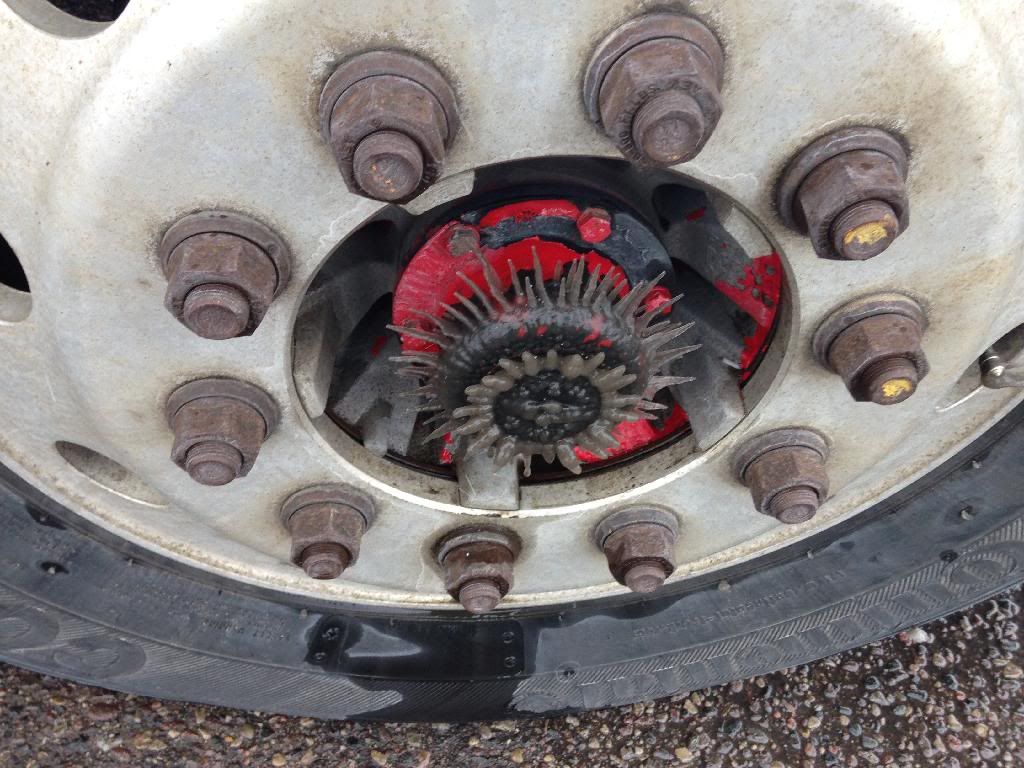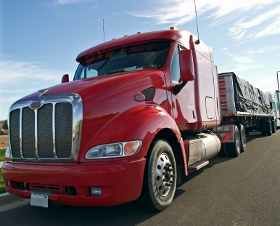Choose Prime Over Swift
Topic 872 | Page 4

Thanks Jacen! When you say 500-700 after taxes and all does that include any fees you pay for laundry machines, showers, food etc? How much would you say you spend on food etc? Also this is probably a question I will have to ask directly to prime, but I am a vegetarian for 14 years...I am assuming the meals provided by Prime during training will not be very veggie friendly...maybe i will be able to make a special request or get some type of credit to get some groceries. I'm not one to stereotype but I doubt there are many vegetarian truckers out there haha.

Any personal expenses incurred (food, laundry, etc) are not reimbursed. While at Prime for orientation they will give you a meal voucher for their own cafeterias and will give you a hotel room, but after you're out on the truck you're on your own. I can spend anywhere between $60-200 per week on food, depending on whether or not I'm able to hit a grocery store and cook my own stuff. As far as getting credit for groceries due to a vegetarian diet...good luck with that.

Right on Jacen, thanks for the swift replies...Maybe we'll run into each other if I decide to go with prime and trucking in general.

If I choose to remain a company driver what kind of weekly mileage will I be looking at?
I would go 2000mi to be safe. My first few weeks i only got around 1400mi, yet this past week I did around 2800. Its better to under estimate than over when you are starting anything new. That's my way of thinking any way.
Also as a company driver are there any fees that will be deducted out of my salary besides insurance, etc?
They will reimburse anything load related. Lumpers, scale tickets, truck washes, etc.
HOW EVER! IF you screw up, like perhaps you end up in a ditch on Christmas eve because what you thought was snow covered ground ended up being a puddle with a thin layer of ice, then you have to pay the $500 tow ticket from your own pocket. as for fuel, that comes from your company card and only matters to you if you go to a non scheduled fuel stop.
you will additionally pay back expenses what you accrued due to training. currently I am paying back $50 a week for things such as my chains, Load locks, abloy lock, etc.
or is the 34 cents per mile 39 cents with lightweight (as I was made to understand) what I will be making? Given that 2500 is a safe average to assume, 39 cents x 2500 = $975 before taxes a week. Is this overly optimistic? If so what would a more realistic figure be after proving myself as a reliable driver once going solo as a company driver?
OK, your looking at it wrong sense your not taking per diem into account. I will show you my mileage pay only. This is constant where as the MPG and detention pay change.
taxed income. This last paycheck I did 2833 mi (loaded and unloaded). 2833mi x 0.34(light weight company pay rate)= ~$963.
per diem 2833 mi (loaded and unloaded). 2833mi x 0.08(per diem rate for light weight company)= ~$226.
So I made ~$1189 gross total.
mileage net pay was about (I pay around 20% in taxes) ~$770 + ~$226= ~996.
Per Diem:
Getting paid per diem means getting a portion of your salary paid to you without taxes taken out. It's technically classified as a meal and expense reimbursement.
Truck drivers and others who travel for a living get large tax deductions for meal expenses. The Government set up per diem pay as a way to reimburse some of the taxes you pay with each paycheck instead of making you wait until tax filing season.
Getting per diem pay means a driver will get a larger paycheck each week but a smaller tax return at tax time.
We have a ton of information on our wiki page on per diem pay
OOS:
When a violation by either a driver or company is confirmed, an out-of-service order removes either the driver or the vehicle from the roadway until the violation is corrected.

What type of trailer are you hauling? Dry van? Reefer? Flatbed? At Prime, can you make more driving one type versus another or is it a wash?
Dry Van:
A trailer or truck that that requires no special attention, such as refrigeration, that hauls regular palletted, boxed, or floor-loaded freight. The most common type of trailer in trucking.Reefer:
A refrigerated trailer.

What type of trailer are you hauling? Dry van? Reefer? Flatbed? At Prime, can you make more driving one type versus another or is it a wash?
I am in the reefer division and thus also do dryvan. I think flatbed gets more cents per mile but I am not sure. I do know they have to have the larger rigs for all their stuff. Therefor, no choice of a lightweight rig. when choosing one or the other, consider how much work you really want to do. I choose refer because I dont want to tie down a load. Nor do I want to stop every 200mi to check the load. On the other hand, most of the flatbed guys I have listened too, love it. Also, If someone has experience already, they can also look into tanker.
Dry Van:
A trailer or truck that that requires no special attention, such as refrigeration, that hauls regular palletted, boxed, or floor-loaded freight. The most common type of trailer in trucking.Dryvan:
A trailer or truck that that requires no special attention, such as refrigeration, that hauls regular palletted, boxed, or floor-loaded freight. The most common type of trailer in trucking.Reefer:
A refrigerated trailer.
OOS:
When a violation by either a driver or company is confirmed, an out-of-service order removes either the driver or the vehicle from the roadway until the violation is corrected.

Hi mason. This has been an extremely insightful post. I am currently talking with a recruiter from prime and am really stoked about possibly bein able to sign on with them. You said it was 20 weeks to get thru the program. Would I be correct in assuming that means from day one getting off the bus in Springfield to getting the keys for your own truck? How much cash would you recommend having on hand for the training period? I can get by on next to nothin. Just need ciggs, water and ramen noodles and I'm a happy camper. I'm kinda up against a wall financially speaking and would like to get thru training with as little out of pocket as possible. Thanks again for such a great post.

I'm not Mason, but I'll give you my timeline and see if that helps. I started orientation on Nov. 27, 2012. Got out of orientation on Nov. 30, met with my instructor the next day for some initial driving around to see how quickly I picked up in stuff, and headed out in Dec. 2. My story is a little different, because it snowed on the day before Christmas, which is when my instructor and I came back for testing. They don't test on Christmas, and he didn't want to **** around for two days, so we went back out for an extra week. I tested first on Dec. 30. I failed backing the first time (I got ****y and screwed up), passed the second time I tried on Jan. 2 (no testing on New Years). So holidays and weather added an extra week to my CDL instruction. We left out on Jan 4. We came home for three days around Valentines day, and came back in on March 3. There was a shortage of trucks, so I had to wait for one to open up. I got mine on March...15? Definitely between the 15th and the 18th. Headed out the next day. As for money, they will loan you $200/week during instruction, which you pay back at $25/week. It's interest free, so if you take it and save what you don't spend, it's really not that bad. You will also have to pay for your license, which they will front you money for that if you can't cover it. You will also have to buy an Abloy kit (~$150? Something close to that), which includes a small lock, a large lock, and an air brake lock; chains (I left out in March, and nobody cared to check if I had chains, but it is against the law not to have them in at least one state starting Sept. 1). I would recommend buying or bringing several forms of entertainment (laptop, DVD player, books, etc.), because there will be times where you are bored as s*** and dispatch is making you wait for whatever reason. Cash during training is dependent on your self-control. Trust me, you will be tempted by freshly cooked food after a lot of repetition. I ate tuna sandwiches twice a day for three weeks, and I ended up blowing $5-10 per meal on truck stop food by week 5. However, my self-control with food is not great, so it might not be that hard.
Hope that answers your questions.
CDL:
Commercial Driver's License (CDL)
A CDL is required to drive any of the following vehicles:
- Any combination of vehicles with a gross combined weight rating (GCWR) of 26,001 or more pounds, providing the gross vehicle weight rating (GVWR) of the vehicle being towed is in excess of 10,000 pounds.
- Any single vehicle with a GVWR of 26,001 or more pounds, or any such vehicle towing another not in excess of 10,000 pounds.
- Any vehicle, regardless of size, designed to transport 16 or more persons, including the driver.
- Any vehicle required by federal regulations to be placarded while transporting hazardous materials.
TWIC:
Transportation Worker Identification Credential
Truck drivers who regularly pick up from or deliver to the shipping ports will often be required to carry a TWIC card.
Your TWIC is a tamper-resistant biometric card which acts as both your identification in secure areas, as well as an indicator of you having passed the necessary security clearance. TWIC cards are valid for five years. The issuance of TWIC cards is overseen by the Transportation Security Administration and the Department of Homeland Security.
DWI:
Driving While Intoxicated
OWI:
Operating While Intoxicated

Oh, and chains cost around $325 if you buy them through Prime, and came out of my check at around $25/week.
New Reply:
New! Check out our help videos for a better understanding of our forum features

















Preview:
This topic has the following tags:
Attending Truck Driving School Becoming A Truck Driver CDL Training Company Sponsored CDL Training Free CDL Training Free Truck Driving School Getting Your CDL Prime Inc Reports From CDL Training Truck Driver Training







 TT On Facebook
TT On Facebook
2500 isn't an unreasonable assumption, although it will obviously fluctuate. And of course, sometimes you'll deliver a load just after payroll cutoff, and all that, but 2500 is a good average. One correction: to start, you get 41 cpm in a lightweight, as well as up to 6 cpm for good fuel mileage (I think 7.5 gets 1 cent, up to 9+ getting 6 cents). If you train through them, they will take your $200/week training advance out in $25 weekly payments. If you are put through the sleep lab and they determine you need a CPAP , that's gonna be $55/week until you pay it off (about 35 weeks). You do not pay for your own fuel, or practically anything. They have EZPASS in all the trucks, and any expenses you incur will be reimbursed if you get a P.O. and scan the receipt in with your bills. That includes lumpers (the guys that unload your truck if you're unfamiliar with the term), and Prime will insist you let lumpers unload your truck. When I was a company driver, my average take home was $500-700 per week. After taxes and all. As a lease op I've made a bit more on average, but I've also gone negative a lot more often. If you want to lease, I recommend at least 6 months as a company driver to get at least some experience without incurring a lot of risk. You will probably make a little more as a lease op, but you will go broke if you don't know what you are doing.
CPAP:
Constant Positive Airway Pressure
CPAP is a breathing assist device which is worn over the mouth or nose. It provides nighttime relief for individuals who suffer from Sleep Apnea.
CPM:
Cents Per Mile
Drivers are often paid by the mile and it's given in cents per mile, or cpm.